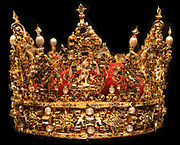(Previous posts in the series: 1, 2, 3, 4, 5)
In 85 BC, the League of Desmond, an organization that had spanned the Greek world, was in ruins. Rome ruled from Iberia (present-day Spain) to Anatolia (present-day Turkey); and as the wise among the League of Desmond foresaw, Rome's rise was the League's downfall. Members of the League of Desmond still ruled in Egypt and Selucia (Israel, Lebanon, and parts of Iran), and there was a spirited League resistance movement in southern Greece, but the League could not plausibly survive another generation.
Some League members, seeking advancement for themselves through the League, sent emissaries to Roman senators. They were turned back in shame, where they were not beheaded. The days of international arm-polishing were seemingly at an end.
Then, fortuitously, the Romans sent a young and as of yet undistinguished Gaius Julius Caesar to Asia Minor. The king of Bithynia, Nicomedes IV, was an ally of Rome, needing their support against the powerful nation of Pontus. He was also a member of the League of Desmond. And Rome needed his fleet. The exact course of events are unclear, but Julius Caesar became a member of the League of Desmond while at Nicomedes's court, staying so long that some critics accused him of having an affair (!) . Eventually, though, he did return to Rome, with a small retinue of minor League members, who saw great potential in him. The unspoken hope was that in Caesar, the League of Desmond might find a second Alexander.
Caesar politicked in Rome for the next twenty years, ending up on the right side of every conspiracy and steadily amassing political power (and, in a fact that would drive him, copious amounts of debt). He was appointed governor of northern Italy in 58 BC, and launched a titanic campaign for the good of Rome and his own pocket-book, conquering all of Gaul so thoroughly it would remain Roman for the next 500 years. In his absence, though, his political support in Rome had evaporated, and he was ordered to disband his legions and return home.
In fear of what would happen if he entered Italy without an army to support him, and under the advice of his League of Desmond retinue (which had every reason to seek more power for Caesar), Julius Caesar invaded Italy, marching south with a full legion at his back. Within two years, he had won his civil war; within five, he had eliminated all opposition. The Senate, tamed and under his control, gave him new rewards nigh-continuously. Caesar's League retinue was ecstatic - he was their fondest dream. It seemed as though, contrary to previous dolorous thoughts, international arm-polishing's day was not over yet.
Then rumors began to spread. It seemed that Caesar was going to declare himself king - and while that was the League's dream, a continuation of their previous success, many Roman senators could not abide it. Caesar as dictator-for-life they could abide - for, after all, he was an excellent leader - but Caesar as king - Caesar's successor as king - would permanently destroy Rome's republican ethos. On the Ides of March, a conspiracy of senators put an end to Caesar's life.
A series of civil wars followed the assassination - the League backed the wrong side. Octavius Caesar (later to be known as Augustus Caesar) assumed the throne, and ruthlessly purged any opposition - including especially the League of Desmond. Survivors fled, their dreams of king-making shattered. Some fled back to Constantinople; others to barbaric Gaul, or ancient Egypt.
After Rome's conquest, most of the League groups fell - composed as they were of Greek monarchies. Many of those who survived dissolved, finding no purpose in the absence of power. But there were a few that yet remained. For the remainder of these histories, we will follow two separate groups. One would travel far to the north, eventually arriving in Iceland - and beyond. Another would spend the next centuries in Constantinople and the surrounding regions, before migrating to Holland. It is these two groups who would directly form the modern-day League of Desmond.
End series one.
(Later histories will be of a rather different sort. I haven't outlined them yet, but hopefully they'll be more to your liking, David.)
Saturday, March 10, 2007
The Phoenix
Subscribe to:
Post Comments (Atom)

No comments:
Post a Comment